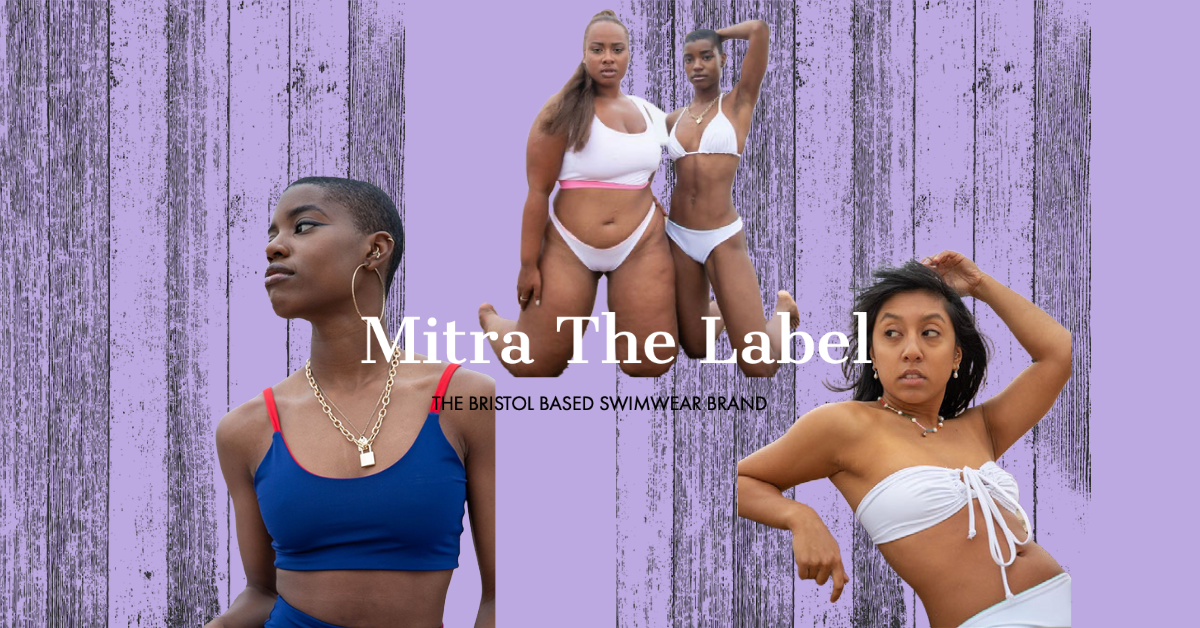Mitra The Label: Interview with the Bristol-based swimwear brand

By Jennifer Gallagher, Second Year, Religion and Theology
The Croft Magazine // Exclusive interview with the Bristol-based sustainable swimwear brand who are turning heads in the fashion world.
My interview with Emily, the founder of the sustainable swimwear start up Mitra The Label, was a long time in the making, exceptionally busy as a young, dynamic business owner, working a part-time job alongside running her company single-handedly (though she admits to getting a little help from her mum). However, when Emily’s nervous smile and wide eyes appeared on my screen after weeks of emailing back and forth, it suddenly made sense that such genuine, honest warmth was at the heart of this remarkable company.
Emily explained that she initially intended to create a festival brand, but this idea was crushed by the pandemic as festivals were cancelled in 2020. Instead, with her delightfully youthful attitude of "if it doesn’t work, it doesn’t work", Emily capitalised upon the UK’s heatwave, and launched a number of her early styles on Depop, and her brand, Mitra The Label, was born. Mitra is the Vedic God of ‘friendships, oaths and the morning’, which Emily explains epitomises her sustainable brand’s values of the same name. She lists a number of successful brands named after Greek gods and goddesses (Nike, Hermes, Tala) with a hopeful giggle.
Emily and I get chatting about sustainability, and I ask why it’s so important to her. With a deep sigh, Emily laments our rampant consumerism is fuelled by YouTube hauls and 'buy now, pay later' schemes. She argues that the millennial obsession with image is failing to recognise that fashion is "just fabric at the end of the day", and that it’s better to invest in a few nice pieces than spend constantly and treat clothing as disposable.
Everything Emily makes is made to order from fabric made from nylon waste collected around the world, which is transformed into ECONYL®️ regenerated nylon, meaning that she does not have stock that goes to waste. This allows her to tailor the fit of her swimwear specifically to the customers’ requirements should they ask her; a service certainly not provided by high street brands. Everything is sent in compostable packaging with an organic tote bag included, although she is currently encouraging repeat customers to opt for no extra packaging in an effort to be even more green.
There are certainly challenges that come with trying to be fully sustainable, as Emily explains that the biodegradable swimwear liners she initially found, would have had to be shipped from Australia, which arguably defeats the point. It seems that part of the struggle for companies such as Mitra The Label is transparency within suppliers, as Emily explains, "not many companies show the whole background". For example, when the Australian swimwear liner company set up in the UK, Emily expressed uncertainty over whether production was relocated, or whether UK orders were still shipped across the world.
I went on to ask Emily about the brand’s image outside of sustainability, after browsing through the strikingly diverse social media posts put out by Mitra The Label, which are so rarely seen in the swimwear industry. I wanted to know if this was an intentional move by Emily, and whether she was conscious of being inclusive in the branding of her company. "Absolutely!", she remarks, and I could tell instantly that these are topics close to her heart, as she explains that she wants her brand to reflect all skin-colours, ethnicities, and disabilities, mentioning that she herself has a disabled brother, which makes her extra aware of including everyone.
She is currently on the hunt for a male-model for her bikinis. Emily’s compassion is laced with frustration, as she questions why major corporations with almost unlimited funding don’t prioritise diversity. She makes the poignant remark that the top CEOs of retail companies could end up in a wheelchair themselves, or give birth to a disabled child, yet they are reluctant to represent this in their own brand. It strikes me that whilst brands such as Mitra The Label are doing their best to fight for a change in the way that clothing is represented, a bigger effort is needed from those at the top, as Emily explains that as with all these things, "it starts off at head office".
Before I say goodbye to Emily, we talk a little more about fast fashion, as she explains that companies need to "stop looking at profits and start looking at what their effects are upon the planet". She explains logically that consumers will continue to buy what companies produce, and so, just like any change in fashion marketing, a positive change in consumer attitudes will realistically only begin following decisions made by the brands’ CEOs.
We touch briefly on the reality that for the consumer, shopping sustainably unfortunately comes with a higher price tag. Emily explains that this is a reality that she has experienced first hand, but she continues to work with slow fashion influencers and activists to encourage all consumers to change their shopping habits and get the most from their wardrobes. Emily reminds me of the importance of thinking of cost per wear, rather than how many items one can buy with their budget. Her enthusiasm and passion for sustainability is admirable, as she negotiates her way around the common stumbling blocks and promotes an 'every-little-helps' approach.
Emily concludes that sustainability in the fashion industry is "moving in a better direction" and is positive that people understand the environmental impact that fast fashion and over consumption have upon the planet. Her worry instead is that "people don’t care enough". She concludes with endearing frustration that the big brands need to be held accountable, and that "life’s too short to worry about a bit of cloth on your body".
Check out Mitra The Label's bright and bold Instagram account, and look out for the launch of their new collection on their website on Friday the 28th of May at 5pm!
Check out
